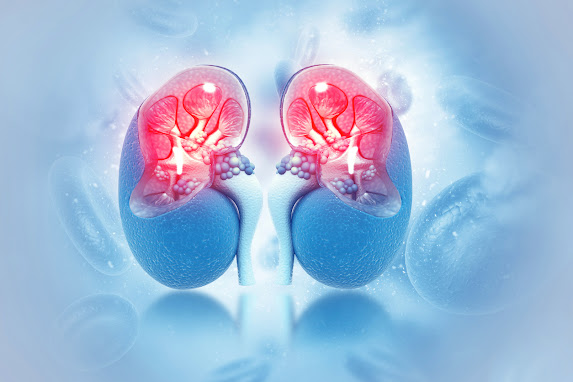Is Ayurveda an effective treatment for chronic kidney disease (CKD)?
Your kidneys work hard throughout the day to remove wastes, toxins, and excess fluid from the blood. Each kidney varies slightly compared to the size of your closed fist. Every 30 minutes, it filters all the blood in your body. Their work duties also include:
- Controlling blood pressure.
- Stimulating the production of red blood cells.
- Keeping your bones healthy.
- Regulating blood chemicals essential for life.
CKD occurs when the kidneys get damaged and cannot filter blood as they should. As the kidneys cannot filter, this excess fluid and waste from blood remains in the body and may cause other health problems, e.g., heart disease, stroke, etc.
The other consequences of CKD include:- Anaemia
- Higher rate of infections
- Low calcium levels
- High potassium and high phosphorus concentrations in the blood
- Loss of appetite, nausea
- Depression
CKD has varying side effects as per the degree of seriousness. And when it is left untreated, it has been seen that CKD can progress to kidney failure and eventually to ESRD. In case of untreated CKD, the kidneys stop working slowly therefore dialysis or a kidney transplant may be required. It must be noted that all patients with kidney disease do not progress to kidney failure. To help patients with CKD recover and prevent them from risk for kidney failure, we must work to control the risk factors responsible for CKD. We must adopt some lifestyle changes; take proper medications as and when required. Ayurveda, the knowledge of life, has been seen as a life saviour for patients with CKD. Chronic kidney disease treatment in ayurveda has been found effective in dealing with the disease.
Causes of Chronic Kidney Disease
It has been observed for years that various reasons are responsible for causing chronic kidney diseases. High blood pressure and Diabetes are the most common conditions leading to CKD. It is very important to find the cause of your kidney disease, as it will be the deciding factor for the treatment you will receive.
Diabetes
Higher glucose levels in your blood damage Glomerular function. If this state is maintained for a long time, your kidneys cannot filter wastes and fluids from your blood. The first sign of kidney damage due to Diabetes can be identified as the presence of proteins in your urine. When these filters get damaged, a protein called albumin passes out of your blood into the urine. A healthy kidney allows a limited amount of albumin to pass from the blood into the urine.
High blood pressure
High blood pressure can cause severe damage to the blood vessels in the kidneys. This hampers the normal functioning of the kidneys. Due to this, the kidneys cannot remove wastes and extra fluid from your body. This excess fluid in the blood further may raise blood pressure more.
Other known causes of kidney disease
Apart from Diabetes and HBP; the majorly affecting causes of CKD in the present world are:- Polycystic kidney disease (PKD).
- Ageing
- Lupus nephritis.
- Drug toxicity
- Genetic conditions, like Alport syndrome
- Glomerulonephritis
- Heavy metal poisoning, like lead poisoning
- Hemolytic uremic syndrome, commonly seen in young children
- Kidney infections
- Obesity
- Renal artery stenosis
Tests for CKD
Blood test
The tests mainly used for the identification of kidney disease are blood tests. These tests measure the levels of waste products in your blood. These tests include eGFR (estimated glomerular filtration rate), creatinine levels, etc. You may suffer from CKD if your kidneys cannot maintain a filtration rate of 90ml/min.
Urine test
There are various tests done to analyse your urine composition too. The urine composition is used to assess the health of your kidneys:
- Assess the albumin and creatinine ratio known as ACR
- Assessment of the presence of blood or protein in your urine
- Along with the eGFR, urine tests can help to give a more accurate picture of your kidney’s health.
Other tests
A few tests also used to assess the levels of damage to your kidneys include:
- Ultrasounds scan (USG), MRI scan, or CT scan. – these scans help to check any blockages
- A kidney biopsy – Although used in rare circumstances, a small sample of kidney tissue is removed and examined microscopically for signs of damage
The test mentioned above results are comprehended as follows: A higher stage for eGFR and ACR indicates the severity of kidney disease.
What are the complications you have to face with CKD?
If you leave your CKD untreated, a few potential complications are associated, eventually leading to kidney failure.
- Fluid buildup. Acute kidney failure may lead to fluid accumulation in your lungs, which can be the reason for shortness of breath observed in kidney patients.
- Chest pain. If the pericardium becomes inflamed, you may experience chest pain.
- Muscle weakness. Your body fluids and electrolytes imbalance can cause muscle weakness resulting in twitches and cramps.
- Permanent kidney damage. Acute kidney failure can cause permanent loss of kidney function or end up in ESRD (end-stage renal disease).
- Death. Acute kidney failure may lead to loss of kidney function and untimely death.
How can kidney patients recover from CKD with Ayurveda?
Ayurveda is an ancient Indian medical science practised for ages. It teaches us ways to manage our health ailments. It works on the principle that the balance between mind, body, and spirit leads to good health. Being originated in India, it is practised across the globe today.
Ayurveda-this branch of medicine is holistic. This implies that the treatment is not prescribed focusing on the symptoms of the disease, but it takes into account many more factors like the conditions of mind and body. As per the beliefs of Ayurvedic science, there are three doshas or body types known as vata, pitta, and kapha, and we will find a disease whenever there is an imbalance amongst these doshas. A person with unbalanced doshas will have physical or emotional characteristics attributed to that dominant element. Ayurveda also suggests the integration of yoga for the alignment of doshas.
CKD Treatment in Ayurveda
Ayurveda states that any kidney-related disease occurs due to the blockage of body channels called srotas. These srotas are responsible for the flow of liquid in and out of the kidneys. Ayurvedic kidney treatment has been proven helpful in treating diseases. It works to eliminate kidney problems and alongside helps in the restoration of damaged kidney cells. Ayurveda makes use of herbal preparations and enhances the functioning of kidneys. It offers treatment for all stages of kidney-related problems.
Chronic Kidney Disease treatment in ayurveda works on a proposed line of treatment. Although, it is a fact that the treatment is person specific, according to the stage and state of a patient. The therapy mostly followed is virechana, swedana, mutrapravartaka, raktaprasadaka, agni deepan and sarva dhathu poshaka. There is strict pathya-apathyas (compatibles-incompatibles) too. Regenerative medicines, Rasayana Chikitsa, help to regenerate nephrons.












Comments
Post a Comment